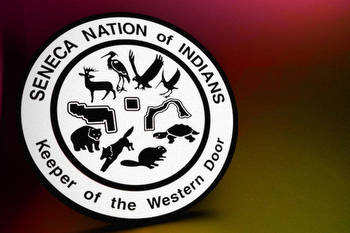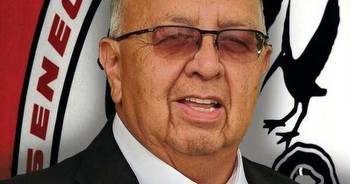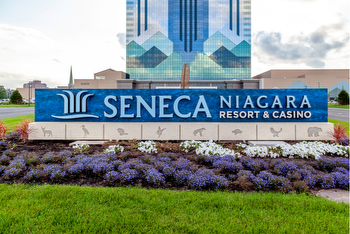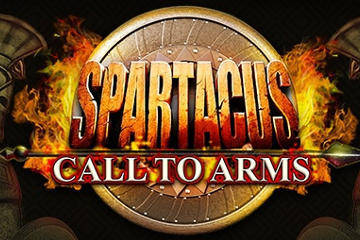Gov. Hochul recuses herself from Seneca casino compact talks

ALBANY – Gov. Kathy Hochul has recused herself from negotiating a new gaming compact with the Seneca Nation, instead tapping two senior aides to hash out the agreement.
Hochul is recusing herself from negotiating a renewal of the Seneca Nation compact because her husband, William Hochul, is senior vice president, general counsel and secretary at Delaware North, the global gaming and hospitality company that has an interest in two racinos that directly compete with the Seneca Nation’s three casinos.
"It's beyond time for our positive impacts and contributions to this area to be recognized in a fair compact," said Seneca Nation President Matthew Pagels.
In 2021, Hochul signed an agreement recusing herself from decisions on “any/all matters related to Delaware North.”
The compact negotiation is a unique situation, however, because no one besides Hochul can ultimately sign off on a deal with the sovereign nation.
In an interview Thursday, Seneca Nation President Rickey Armstrong Sr. said he believed the Hochul administration’s position was that two top aides – Director of State Operations Kathryn Garcia and Counsel Liz Fine – would have final authority to negotiate the deal, while Hochul would simply sign the agreement negotiated by her aides.
The Cataract City and the Senecas are working on a plan that would locate a new downtown sports arena and family entertainment center a block east of the casino, Niagara Falls Mayor Robert M. Restaino said Thursday.
“I think those two ladies have the cards in their hands, at this point,” Armstrong said.
But Amstrong also said he suspects that Hochul will likely not be able to fully recuse herself from the negotiations.
Hochul’s office says the governor has delegated all negotiations to staff. Hochul chose to recuse herself to a degree beyond what is required by law in an effort to restore faith in state government, her office says.
“I don't know how they react in the state, but I don't sign nothing unless I know what I'm signing,” Armstrong said. “I think she has to know, to some degree, and agree, to some degree. I also think she's pushing the buttons behind the scenes. ... Those ladies (Garcia and Fine) – even though she has confidence in them, and they're calling the shots, and think she’s going to rely on them – at the same time, she has interaction with them, and she probably discusses (the negotiations). I just hope it stays fair on our end.”
Hochul’s press secretary, Hazel Crampton-Hays, added that staff from the Executive Chamber and the state Gaming Commission “have been having substantive negotiations with the Seneca Nation for 11 months. We are fully committed to continuing to meet, discuss and negotiate a compact, and we are confident that the process will continue in a way that best serves New Yorkers."
The Senecas filed a motion last week with the U.S. District Court in Buffalo to halt enforcement of a judgment that the tribe should make the payments.
Armstrong's comments came as prominent Seneca officials, including several former presidents, held a rally on Thursday seeking a "fair compact" near their Seneca Buffalo Creek Casino in downtown Buffalo.
While the Seneca Nation has been meeting with more junior Hochul aides for months, direct discussions between Armstrong, Fine and Garcia began only earlier this month, Armstrong said. The legislative session in Albany is set to end June 8, and Armstrong is hoping that, before then, the Legislature will pass a bill authorizing the Nation to strike a new gaming compact with New York, as required.
The compact was originally signed between Gov. George Pataki and the Seneca Nation in 2002. In exchange for paying a portion of revenues on slot machines and other gaming devices to New York State, the Nation says it obtained the exclusive right to offer these devices west of State Route 14. But the Nation believes that three racinos that have since opened within that area – including two associated with Delaware North – are in violation of the agreement.
The Senecas began in 2017 withholding from New York hundreds of millions of dollars in slot machine profits, saying the compact did not require the payments to continue. After three federal judges ruled against the Senecas, Hochul froze a Seneca bank account in March 2022. That prompted the Seneca Nation to pay the state nearly $565 million the courts ruled it owed.
The current compact expires in early December. Armstrong said about 80% to 85% of a new agreement has been hashed out, with the outstanding issues the most difficult.
Under the current agreement, the Nation has to pay 25% of the gaming revenue to New York State, a figure Armstrong believes should go down under the new agreement. He notes that the gaming marketplace in the northeast United States has become far more saturated since 2002, decreasing the value of the exclusivity zone.
The Seneca Nation of Indians should pay a lower share of its slot machine revenues to New York in its next casino deal with Albany, the Nation's president said Wednesday.
“I think it was high to begin with, at 25%,” he said. “With the intrusion of commercial gaming into our area or nearby our area, I don't see the exclusivity having the same value it did 20 years ago. I think that 25% is a little excessive. We see it as a lesser amount.”
In negotiating the tax issue, there are carrots that New York could dangle to the Nation. For instance, unlike New York’s casinos, the Nation’s casinos are not allowed to operate in the highly lucrative online sports betting market. Armstrong declined to comment on the specifics of the Nation’s negotiating positions, but said that generally, sports betting was an “attractive business that we would love to look at at some point.”
Another potential new frontier for New York’s gaming industry is online casino gaming, such as online slots, table games and live dealer games. The chairman of the Senate Gaming and Wagering Committee, Sen. Joseph Addabbo, has introduced a bill to legalize such online gaming in New York. While the bill’s prospects are uncertain in the short term, the Nation could push in its talks with the Hochul administration to allow the Nation into that marketplace if and when it is legalized. Armstrong declined to comment on whether that would be part of negotiations.
Delaware North lobbied state
Lobbying records show that in late 2021, a lobbying firm representing Delaware North lobbied the Hochul administration concerning the Seneca Nation compact, seeking to make the new compact more favorable to the company. It is not clear exactly what changes Delaware North was seeking.
Like other casinos in New York, the three owned by the Seneca Nation of Indians have closed their doors in a response to the threat of the novel coronavirus. Unlike the owners of other casinos, though, the Senecas owe New York State more than $255 million in back payments – money they are refusing to pay even though arbitrators
Asked whether he would be open to any changes to the compact benefitting Delaware North, Armstrong said: “I don't think we need to help our competitors in any way.”
Armstrong has been trying to have a one-on-one meeting with Hochul in recent months, but has been unsuccessful. He recently penned an op-ed in The Buffalo News lamenting the “continued and embarrassing pattern of disrespect from New York’s highest office.”
Armstrong said on Thursday that Hochul’s recusal decision could have influenced the decision not to meet. Armstrong also believes that the controversial Hochul decision last year – to issue a subpoena freezing key Seneca bank accounts in order to gain hundreds-of-millions in disputed revenue – could also be a factor in Hochul’s reluctance to meet, noting such a meeting could be “awkward.”
“Maybe it's too awkward for her, I don't know,” Armstrong said. “But I think as a leader at that level, you know, sometimes you just have to forget about it and smile when you don't want to smile.”
Armstrong said in his experience, Pataki was the easiest governor with whom to talk, and noted that Pataki even once called to wish him a happy birthday. He said former Gov. Andrew Cuomo was a “bully.”
As for Hochul, he said, the Nation “hoped for a more reasonable person that we could interact with and work with as a partner. We haven't seen it yet.”
The Seneca cause has some support in the State Legislature. Representatives for Republican State Sen. George Borrello of Sunset Bay and Democratic State Sen. Tim Kennedy of Buffalo both spoke at the rally Thursday pressing for a "fair compact" for the Nation.
Kennedy, an influential member of the majority Senate Democratic conference, is the chairman of the State Senate subcommittee on State-Native American Relations. His chief of staff, Adam Fogel, said that Kennedy was seeking a "fair compact that allows the Seneca Nation, which is an economic engine of our community, and one of the largest job creators in our region, to continue to operate as it has for decades."
When Senecas and New York do strike a deal, it will still require final approval from the federal Department of Interior. Last year, President Joe Biden's administration rejected a gaming compact struck by California under the belief that the terms were unfair to two Native American nations there.






































